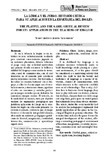Mostrar el registro sencillo del ítem
La lúdica y el juego: revisión crítica para su aplicación en la enseñanza del inglés
| dc.rights.license | http://creativecommons.org/licenses/by-nc-sa/3.0/ve/ | es_VE |
| dc.contributor.author | Alcedo, Yesser | |
| dc.date.accessioned | 2020-08-08T04:08:54Z | |
| dc.date.available | 2020-08-08T04:08:54Z | |
| dc.date.issued | 2020-08-07 | |
| dc.identifier.issn | 1690-3544 | es |
| dc.identifier.uri | http://www.saber.ula.ve/handle/123456789/46956 | |
| dc.description.abstract | Si en la infancia la lengua es un auténtico recurso voluntariamente realizado para construir conocimientos jugando en un ambiente placentero, debería valorarse al juego como una actividad motivadora que permite al niño encontrar la belleza y utilidad del lenguaje como medio de invención, canal de comunicación, con el cual interactúa en el contexto para establecer nuevas relaciones sociales. Por tal razón, a los niños les encanta fantasear con el lenguaje, a ellos les fascina jugar con el vocabulario nuevo, exteriorizar ritmos, agudizar el oído con canciones y cantarlas, participar en juegos variados que en definitiva los mantienen siempre atentos. El artículo, en la modalidad de ensayo, tuvo por objetivo analizar los argumentos pedagógicos que justifican aplicación del juego en la enseñanza del inglés en educación primaria. La revisión realizada, evidencia que el juego: favorece el desarrollo integral del alumno, ofreciendo un ambiente pedagógico gratificante de libertad, imaginación, creatividad, interacción, comunicación y aprendizaje significativo. | es_VE |
| dc.language.iso | es | es_VE |
| dc.rights | info:eu-repo/semantics/openAccess | es_VE |
| dc.subject | Lúdica | es_VE |
| dc.subject | juego | es_VE |
| dc.subject | revisión crítica | es_VE |
| dc.subject | aplicación | es_VE |
| dc.subject | enseñanza del inglés | es_VE |
| dc.title | La lúdica y el juego: revisión crítica para su aplicación en la enseñanza del inglés | es_VE |
| dc.title.alternative | The playful and the game: critical review for its application in the teaching of english | es_VE |
| dc.type | info:eu-repo/semantics/article | es_VE |
| dcterms.dateAccepted | 19/10/2019 | es |
| dcterms.dateSubmitted | 07/07/2019 | es |
| dc.description.abstract1 | If in childhood the language is an authentic resource voluntarily made to build knowledge while playing in a pleasant environment, if so the game should be considered as a motivating activity that allows the child to find the beauty and usefulness of language as a means of invention, channel of communication, with which interacts in the context to establish new social relationships. This is why, children love to fantasize about language, they love to play with new vocabulary, externalize rhythms, sharpen their ears with songs and sing them, participate in varied games that ultimately keep them always attentive. The article, under the essay modality had to analyze the pedagogical arguments that justify application of the game in the teaching of English in primary education. The revision done indicates the game: favors the integral development of the student, offering a rewarding pedagogical environment of freedom, imagination, creativity, interaction, communication and meaningful learning. | es_VE |
| dc.description.colacion | 88-107 | es_VE |
| dc.description.email | yeseralacedo@gmail.com | es_VE |
| dc.description.frecuencia | Anual | es |
| dc.identifier.depositolegal | 2002TA1412 | es |
| dc.publisher.pais | Venezuela | es_VE |
| dc.subject.facultad | Núcleo Táchira (NUTULA) | es_VE |
| dc.subject.institucion | Universidad de Los Andes | es_VE |
| dc.subject.keywords | Playful | es_VE |
| dc.subject.keywords | game | es_VE |
| dc.subject.keywords | critical review | es_VE |
| dc.subject.keywords | application | es_VE |
| dc.subject.keywords | teaching English | es_VE |
| dc.subject.seccion | Heurística: Artículos | es_VE |
| dc.subject.thematiccategory | Ciencias Económicas y Sociales | es_VE |
| dc.subject.tipo | Revistas | es_VE |
| dc.subject.unidadinv | Grupo de Investigación de Historia de la Educación y Representaciones (HEDURE) | es_VE |
| dc.type.media | Texto | es_VE |
Ficheros en el ítem
Este ítem aparece en la(s) siguiente(s) colección(ones)
-
Heurística - Número 022
enero - diciembre 2019


